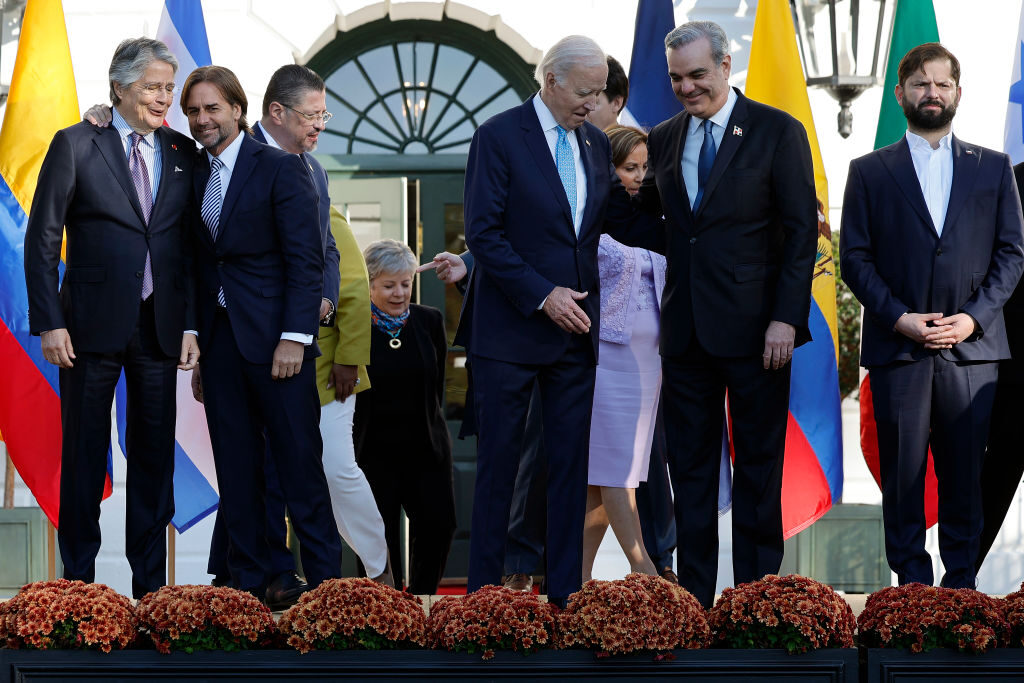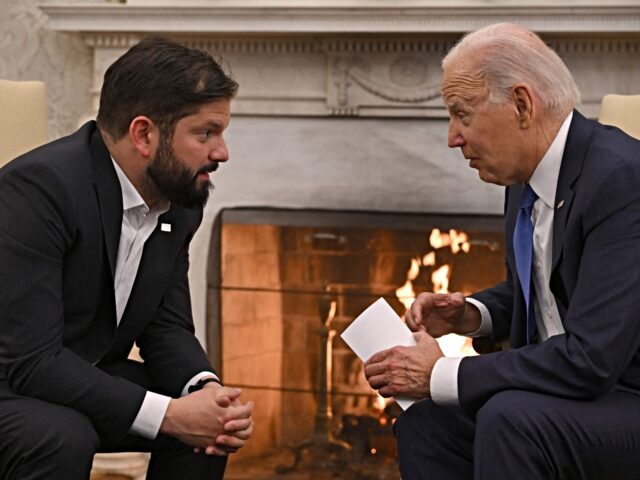President Joe Biden “stressed the importance” of supporting Ukraine during a meeting Wednesday with Chilean President Gabriel Boric, who is in Washington to attend a series of economic engagements and to expand Chile’s trade ties to America.
The meeting between Biden and Boric in the White House marked the 200th anniversary of diplomatic relations between the two countries. During remarks to journalists prior to their closed-door meeting, Boric described the objective of his visit of helping “strengthen our relationships” and noted the great benefits Chile has received from a 20-year-old free trade agreement with America.
The emphasis on discussing Ukraine during a meeting meant to address the economic concerns of the Western Hemisphere continues a legacy of disinterest for Latin America under the Biden administration, which has caused the deterioration in formerly friendly ties to nations such as El Salvador and watched on the sidelines as China and Iran, among other nefarious actors, increased their influence in Brazil, Venezuela, Colombia, Bolivia, and Chile, among other nations.

Ecuadoran President Guillermo Lasso, Uruguayan President Luis Lacalle Pou, Costa Rican President Rodrigo Chaves Robles, U.S. President Joe Biden, Dominican President Luis Abinader, Chilean President Gabriel Boric, and other leaders gather during the inaugural Americas Partnership For Economic Prosperity Leaders’ Summit on November 03, 2023 in Washington, DC. (Chip Somodevilla/Getty)
Boric is among nine Western Hemisphere leaders visiting Washington this week for a meeting of the Americas Partnership for Economic Prosperity (APEP), a new organization Biden established last week during the Summit of the Americas to expand trade relations between the nations belonging to the U.S.-Mexico-Canada (USMCA) trade agreement, the successor to NAFTA, and South America. In addition to the Chilean president, the heads of government of Colombia, Costa Rica, Peru, Uruguay, Canada, Ecuador, and the Dominican Republic, among others, are expected to attend the APEP meeting.
The Argentine news network Infobae, citing economic analysts, noted that many of the countries participating in the meeting are seeking expanded, or even free, trade arrangements with the United States to boost their GDPs – potentially leveraging communist China’s use of the Belt and Road Initiative (BRI), a global debt-trap scheme, to increase its influence in the region. Chile is both a key member of the BRI and has enjoyed a free trade agreement with America for 20 years.
Boric, a radical leftist who has described himself as “to the left of” the Communist Party of Chile, has governed seeking to expand free trade ties with much of the world. He has particularly leveraged his ideological similarities to attract Chinese corporate investment in the country, traveling to Beijing in October and urging greater expansion of the BRI in his country.
Boric has also repeatedly warned that Chinese domination of the Chilean economy, particularly of Chile’s lucrative copper and lithium mining industries, could hurt the country in the long run. Boric nationalized the Chilean lithium industry in April, protecting it from a Chinese takeover.
According to the White House transcript of the leaders’ remarks, neither mentioned Ukraine directly prior to their meeting, yet the topic featured as a priority in the White House readout of their private conversation.
“President Joseph R. Biden, Jr met today with President Gabriel Boric of Chile at the White House to deepen the U.S.-Chile bilateral relationship,” the White House readout read. “President Biden and President Boric discussed ways the United States and Chile can continue to expand our economic engagement, including through the Americas Partnership, to promote economic growth for our two countries while at the same time creating good-quality jobs and protecting labor rights.”
Biden reportedly used the meeting to discuss “Israel’s right to defend itself,” Venezuelan refugees – which number about half a million in Chile – and Russia’s ongoing invasion of Ukraine.
“President Biden made clear that the United States will continue to stand with Israel and affirmed Israel’s right to defend itself in line with international humanitarian law,” the readout continued. “President Biden also stressed the importance of continuing to support Ukraine and expressed concern about the global effects of Russia’s war against Ukraine, particularly on food and energy security.”
The public exchange between the two presidents was awkward, as Biden attempted to crack jokes about the 37-year-old Boric’s age.
“The only problem I have with you is you’re too young,” Biden, soon to turn 81, quipped, to which Boric replied, “that’s not a problem.”
Chilean media reported on meeting in part by highlighting the “peculiar joke.”
Elsewhere in the public part of their meeting, Boric commended Biden for sharing his values of “preoccupation for human rights, democracy, and also the rights of the workers in the world,” and listed among his top priorities “the green transition, of course; immigration; migration, the economic development; and, of course, some — some issues that are going on in this — in this world that it’s really hard nowadays,” without elaborating.
Boric’s presidential office did not list the war in Ukraine as a priority in its official announcement of his travel to Washington.
“The objective in this instance is the deepening of economic cooperation, with a focus on protecting democracy, the rights of workers, and the protection of the environment,” the official statement explained, “as well as the promotion of development and economic prosperity in the region.”
Boric was nonetheless like a receptive audience for Biden’s insistence on discussion Ukraine, as he is the only left-wing leader in Latin America to categorically condemn the Russian invasion. Neighboring socialists Lula da Silva of Brazil, Nicolás Maduro of Venezuela, Luis Arce of Bolivia, Gustavo Petro of Colombia, and Alberto Fernández of Argentina have offer at most ambivalent remarks about the Russian invasion, and in some cases – Lula in particular – condemned Ukrainian President Volodymyr Zelensky for getting invaded.
Boric, in contrast, has repeatedly defended Ukraine’s sovereignty.
“We see it in different places of our planet, but today, in this place, the situation in Ukraine has been under debate. I think it is important that from Latin America we say it clearly: what is happening in Ukraine is a war of imperial aggression,” Boric said during a summit of European and Latin American nations in July, adding that the war was “unacceptable.”
At the United Nations General Assembly in September, Boric condemned the “unjust war of aggression unleashed by Russia on Ukraine” and extended “solidarity” to the Ukrainian people.

COMMENTS
Please let us know if you're having issues with commenting.